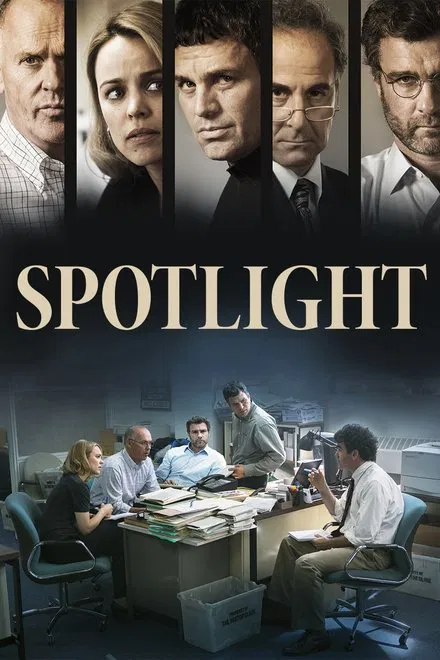
Directed by: Tom McCarthy
Starring: Mark Ruffalo, Michael Keaton, Rachel McAdams, Liev Schreiber, John Slattery, Stanley Tucci
📰 Introduction: Journalism on Trial
Spotlight (2015) is more than a film about journalism; it is a testament to the power of truth, the resilience of investigative reporters, and the systemic dangers of silence and complicity. Based on the true story of the Boston Globe’s “Spotlight” team, the film chronicles the painstaking and often perilous process of uncovering the Catholic Church’s decades-long cover-up of widespread child sexual abuse. The resulting exposé sent shockwaves around the world, forcing institutions to reckon with their failures and inspiring survivors to come forward.
🔎 The Anatomy of an Investigation
The film opens in 2001, as new editor Marty Baron (Liev Schreiber) encourages the Spotlight team—a small group of veteran investigative journalists led by Walter “Robby” Robinson (Michael Keaton)—to revisit a buried story about a priest accused of molesting dozens of children. What follows is not the romanticized “eureka” moment of classic detective fiction, but a patient, methodical process: searching archives, interviewing survivors, confronting reluctant sources, and battling institutional resistance at every turn.
Reporters Michael Rezendes (Mark Ruffalo), Sacha Pfeiffer (Rachel McAdams), and Matt Carroll (Brian d’Arcy James) pursue leads with empathy and rigor, slowly assembling a damning mosaic. Each new discovery is met with a mix of triumph and horror. The team’s dedication is contrasted with the community’s collective desire to look away, raising questions about the role of the press, the limits of accountability, and the price of silence.
⛪ Systems of Power and Complicity
What makes Spotlight so compelling is its refusal to demonize individuals or sensationalize its subject matter. Instead, it examines how institutions—religious, legal, journalistic, and social—can conspire, wittingly or not, to protect themselves at the expense of the vulnerable. The film details the tactics used by the Church to obscure the truth: secret settlements, transferred priests, and appeals to community loyalty. Yet it also implicates the Globe itself, as several reporters realize that earlier leads had been missed or dismissed.
The emotional core of the film is the survivors, whose stories unfold gradually and often painfully. Their bravery, combined with the dogged persistence of the Spotlight team, forms a chorus of voices demanding justice. In one of the film’s most powerful moments, the magnitude of the scandal becomes clear—not as a collection of isolated incidents, but as a system-wide failure that spans generations and continents.
🗂️ The Ethics and Burden of Journalism
Spotlight is not a film about heroes, but about responsibility. The journalists are portrayed as flawed, overworked, and at times uncertain about the impact of their work. The pressure to get the story right is immense; the fear of getting it wrong is ever-present. The film asks difficult questions: How do you confront an institution beloved by millions? How do you report on suffering without exploiting it? How do you balance empathy with skepticism?
The narrative is propelled by long nights, tense editorial meetings, and the unglamorous realities of journalism—door-knocking, data sifting, and painstaking fact-checking. By the time the Globe publishes its findings, the scope of the tragedy is almost overwhelming, yet the sense of accomplishment is tempered by the knowledge that the work is far from finished.
🌎 The Aftermath: Truth as Catalyst
The publication of the Spotlight series was a watershed moment, resulting in thousands of survivors coming forward, investigations worldwide, and a re-examination of institutional accountability. The film closes with a stark list of other locations where similar abuse scandals were uncovered, underscoring the global reach of the issue. The real-life Spotlight team went on to win the Pulitzer Prize for Public Service, but the work’s true legacy lies in the survivors empowered to tell their stories.
Spotlight resonates because it does not offer easy answers or neat closure. Instead, it affirms the necessity of uncomfortable truths and the importance of holding the powerful to account. In a world of shrinking newsrooms and rising skepticism about the media, the film is a rallying cry for investigative journalism—and a reminder that, sometimes, shining a light is the most radical act of all.
🎯 Final Thoughts: The Legacy of Spotlight
As a cinematic experience, Spotlight is taut, restrained, and deeply humane. Its performances are understated, its direction precise, and its moral vision uncompromising. It stands as a rare film that celebrates not just the value of truth, but the courage required to seek it. In the end, the story of the Spotlight team is a story about all of us: our responsibilities to one another, the institutions we trust, and the hard but necessary work of seeing—and speaking—the truth.